Your Jeep Cherokee may shake due to issues with the tires or wheels. Imbalanced tires or worn-out suspension components can cause the shaking.
When driving your Jeep Cherokee, you may notice a shaking sensation that affects the steering wheel or the entire vehicle. This issue can be concerning and potentially dangerous if left unaddressed. It’s important to identify the root cause of the vibration to ensure safe driving and prevent further damage to your vehicle.
We will explore the common reasons why your Jeep Cherokee shakes and what steps you can take to resolve this issue effectively. Understanding these factors can help you address the problem and restore a smooth driving experience with your Jeep Cherokee.
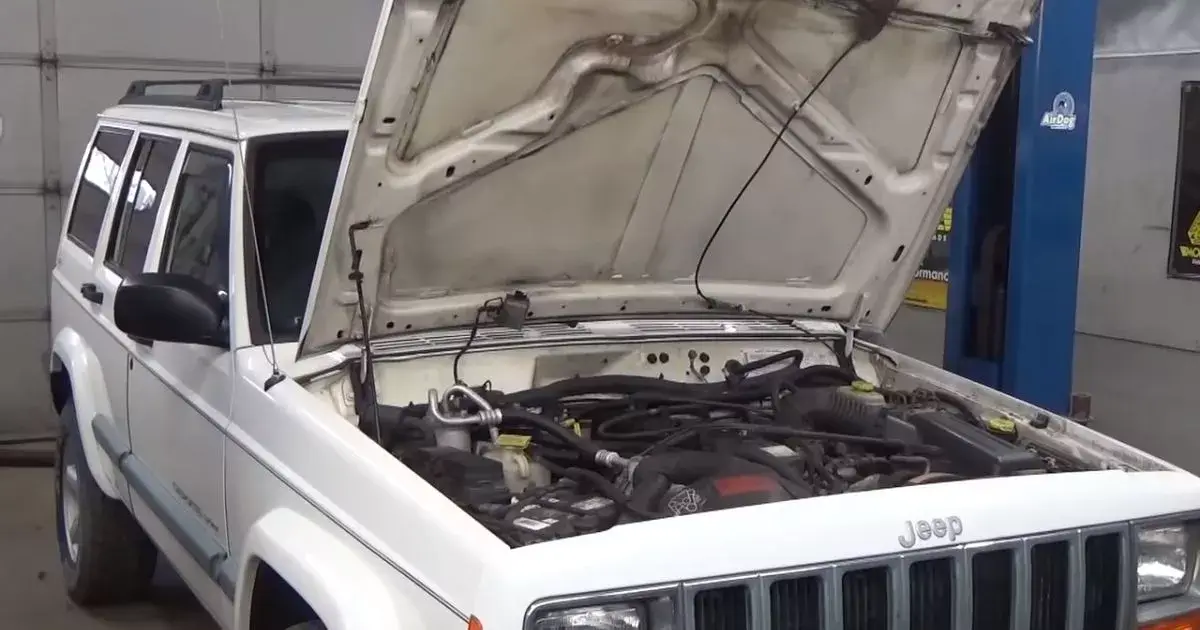
Common Causes Of Jeep Cherokee Shakes
A. Wheel And Tire Issues
If you’ve been experiencing a shaking sensation in your Jeep Cherokee, it can be quite unnerving. Several factors can contribute to this issue, including wheel and tire problems. Identifying the cause of the shake is crucial to ensure a safe and smooth ride. In this section, we will discuss the common causes of Jeep Cherokee shakes related to wheel and tire issues.
1. Tire Imbalance
Tire imbalance is one of the primary culprits behind the shaking of your Jeep Cherokee. When your tires are not balanced properly, it can result in vibrations at high speeds, causing an uncomfortable and jarring experience.
A tire imbalance occurs when the weight distribution is uneven, leading to irregular rotations. This imbalance can be caused by factors such as normal wear and tear, hitting potholes or curbs, or even the loss of wheel weights.
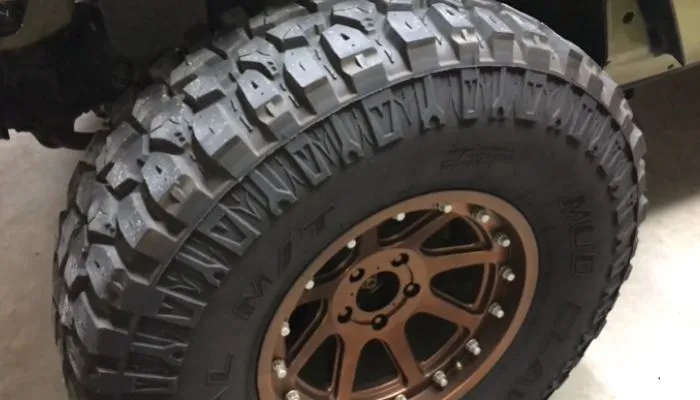
2. Uneven Tire Wear
Uneven tire wear is another common cause of Jeep Cherokee shakes. Over time, tire tread can wear out unevenly due to factors like bad suspension components, improper alignment, or even underinflation.
When this happens, the tires can no longer provide a smooth and consistent contact patch with the road surface, resulting in vibrations and a shaky ride. Regularly checking your tire tread depth and ensuring proper tire maintenance can help prevent uneven tire wear.
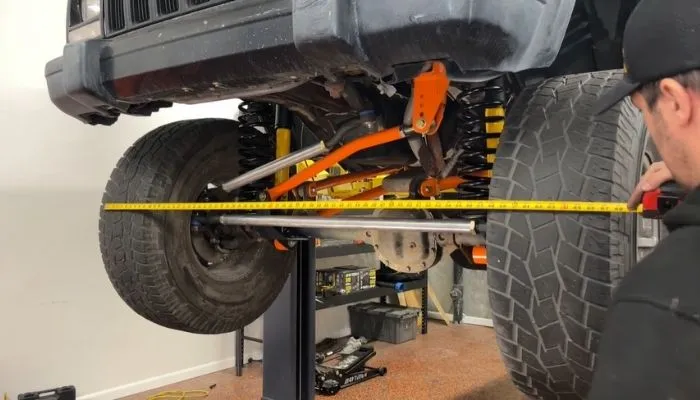
3. Wheel Misalignment
Wheel misalignment plays a significant role in causing your Jeep Cherokee to shake. Misalignment occurs when the angles and position of your wheels are not in accordance with the manufacturer’s specifications. Common causes of wheel misalignment include hitting curbs, potholes, or objects on the road.
When your wheels are misaligned, it can lead to uneven tire wear, steering pull, and vibrations. Getting your wheels properly aligned by a professional technician can solve this issue and restore a smoother ride.
Also Read: Why Does My Jeep Patriot Shake
B. Suspension Issues
When it comes to troubleshooting and resolving the shakes in your Jeep Cherokee, it is essential to identify the common causes, particularly those related to suspension issues. By addressing these problems promptly, you can maintain smooth and comfortable driving experiences. In this section, we will discuss the most prevalent suspension issues that can lead to a shaky Jeep Cherokee.
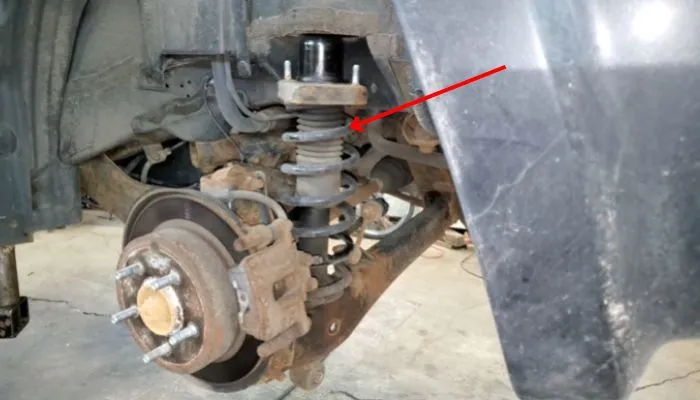
1. Worn Out Shock Absorbers Or Struts
If you have been experiencing vibrations or a bumpy ride in your Jeep Cherokee, one possible cause is worn-out shock absorbers or struts. These components play a crucial role in keeping your vehicle stable and preventing excessive motion.
Over time, the continuous strain on the shock absorbers or struts can lead to wear and tear, reducing their effectiveness. When worn-out, they are unable to properly absorb the impact of the road, resulting in vibrations and shaking sensations.
2. Faulty Control Arm Bushings
In the suspension system of a Jeep Cherokee, control arm bushings are responsible for providing support and flexibility. However, if these bushings become damaged or worn out, it can lead to significant instability and shaking while driving.
The control arm bushings act as a cushion between the frame of your Jeep and the control arm, allowing smooth movement. When they become faulty, the stability of the entire suspension system is compromised, resulting in shakes and vibrations.
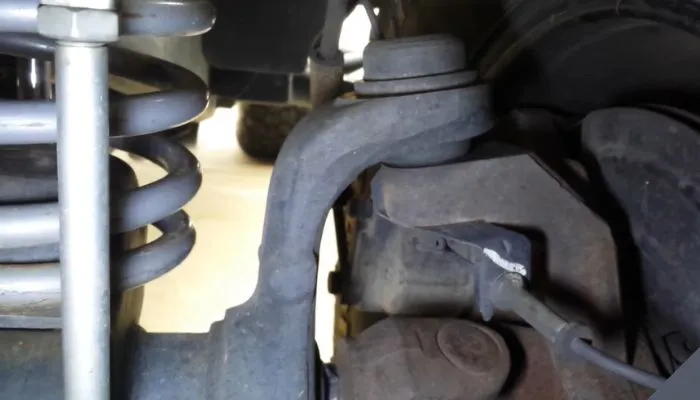
3. Loose Ball Joints
Another common cause of a shaking Jeep Cherokee is loose ball joints. Ball joints are spherical bearings that connect the control arms to the steering knuckles. They enable the suspension to move freely while maintaining stability.
However, with regular use, ball joints can become loose or worn out, leading to a lack of control and stability. When these joints are loose, the suspension system becomes compromised, causing vibrations and shaking sensations.
4. Track Bar Issues
The track bar is an essential component of your Jeep Cherokee’s suspension system. It helps to control the lateral movement of the axle, ensuring proper alignment and stability.
However, if the track bar becomes damaged or misaligned, it can cause your Jeep to shake. A bent or worn-out track bar can result in increased side-to-side movement, leading to vibrations and an unstable driving experience.
Also Read: Why Does My Jeep Shake When I Accelerate
C. Drivetrain Issues
If your Jeep Cherokee is experiencing shaking or vibrations, it could be due to various drivetrain issues. Here are some common causes that may be contributing to the problem:
1. Worn-out Or Damaged Cv Joints
The CV joints, also known as constant velocity joints, are critical components of your Jeep Cherokee’s drivetrain. When these joints become worn or damaged, they can cause shaking and vibrations, particularly during acceleration or when turning. It is important to inspect the CV joints regularly and replace them if any signs of wear or damage are present.
2. Failing U-joints
U-joints, also called universal joints, are responsible for transmitting power from the transmission to the wheels. When these joints fail, they can lead to vibrations and shaking in the drivetrain.
Regular maintenance and lubrication of the U-joints can help prevent issues, but if they are failing, they should be replaced promptly to avoid further damage to the drivetrain.
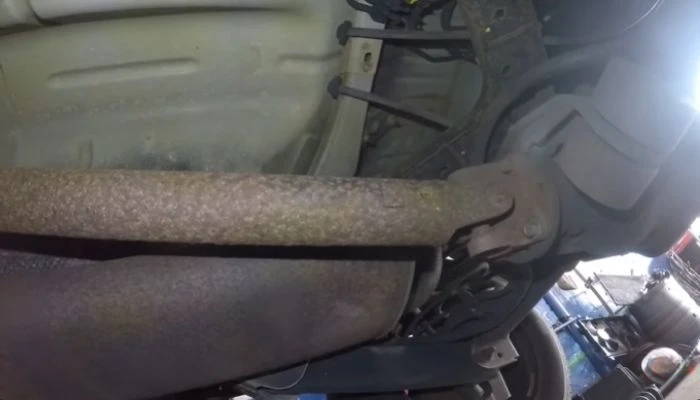
3. Problems With The Driveshaft Or Differential
The driveshaft and differential play crucial roles in the transmission of power from the engine to the wheels. Any issues with these components, such as imbalanced or damaged driveshafts, or problems within the differential, can result in noticeable shaking and vibrations.
Regular inspections and maintenance of these parts can help identify and address potential problems before they worsen.
Also Read: Why is My Jeep Grand Cherokee Shaking
D. Engine Issues
If you’re experiencing shakes or vibrations in your Jeep Cherokee, it can be a cause for concern. Identifying the root of the problem is crucial in ensuring the safety and performance of your vehicle. One of the primary areas to investigate is the engine, as several issues can lead to vibrations. Below, we’ll explore some common engine-related causes for Jeep Cherokee shakes.
1. Misfiring Cylinders
Misfiring cylinders can lead to noticeable shakes in your Jeep Cherokee. When one or more cylinders fail to ignite the air/fuel mixture properly, it disrupts the smooth operation of the engine. This can result in erratic movements and vibrations, especially when accelerating or idling.
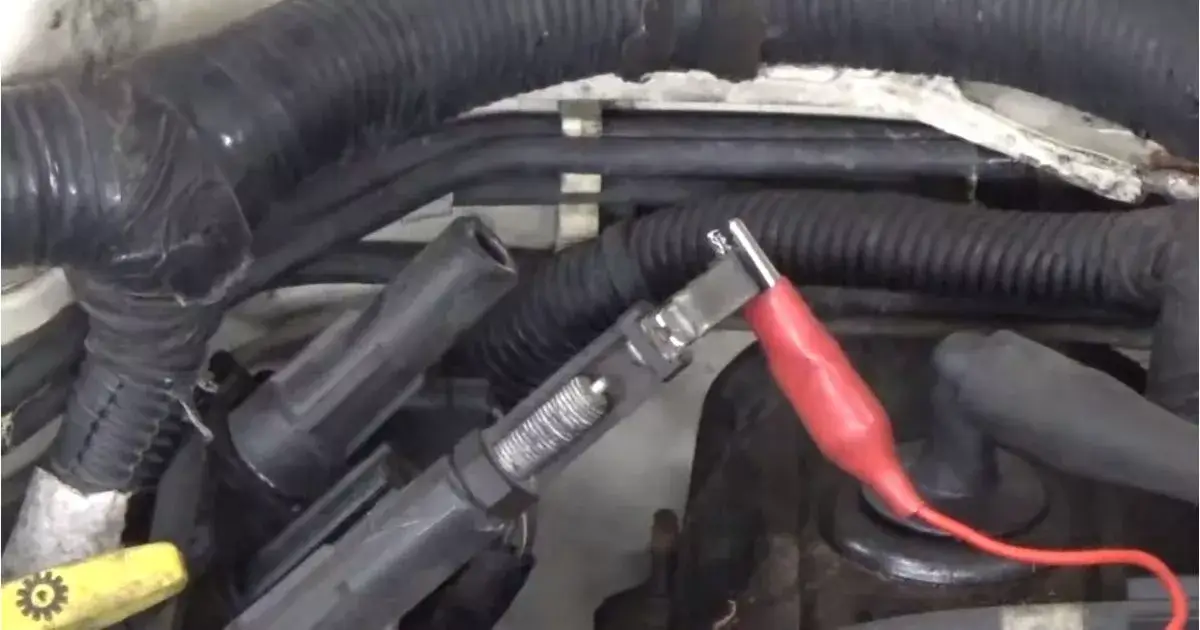
2. Faulty Spark Plugs Or Ignition Coils
If your spark plugs or ignition coils are defective, it can lead to irregular combustion in the engine, causing it to shake. Damaged or worn spark plugs and ignition coils can disrupt the proper ignition process, leading to rough idling and performance issues.
3. Worn Engine Mounts
Worn engine mounts can also contribute to shaking in the Jeep Cherokee. These mounts are responsible for securing the engine to the vehicle’s frame, absorbing vibrations and ensuring a smooth ride. When they wear out, the engine can become less stable, leading to noticeable shakes and vibrations, especially during acceleration and deceleration.
Also Read: Why Does My Jeep Patriot Jerk When I Accelerate
E. Brake System Issues
Jeep Cherokee shakes can be caused by brake system issues. Common reasons include worn brake pads, warped rotors, or loose calipers. Several brake system problems can lead to vibrations and shaking in your Jeep Cherokee, including:
1. Warped Brake Rotors
One of the main culprits behind a vibrating Jeep Cherokee is warped brake rotors. Brake rotors, also known as brake discs, are the circular metal discs that the brake pads clamp onto to slow or stop the vehicle. Over time, the constant friction and heat generated during braking can cause the rotors to warp.
This warping can create an uneven surface, leading to vibrations when applying the brakes. As your Jeep Cherokee gains speed, the shaking sensation may intensify. If left unaddressed, warped brake rotors can potentially affect the overall braking performance and safety of your vehicle.
2. Sticking Brake Calipers
Another common cause of Jeep Cherokee shakes related to the brake system is sticking brake calipers. Brake calipers are the devices that house the brake pads and clamp them onto the brake rotors when you apply the brakes.
Over time, brake calipers can become stuck or seize due to various reasons, such as brake fluid contamination or corrosion. When a brake caliper sticks, it fails to release the brake pads correctly, leading to uneven braking and potentially causing vibrations in the Jeep Cherokee.
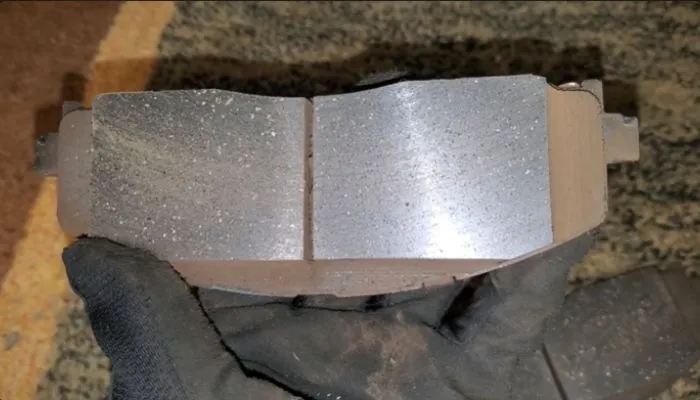
3. Worn-out Brake Pads
Worn-out brake pads can also contribute to the shaking sensation in your Jeep Cherokee. Brake pads are designed to provide friction against the brake rotors to slow down or stop the vehicle. However, as they wear down over time, they become less effective at generating a smooth and consistent stopping power.
The uneven contact between worn-out brake pads and the rotors can result in vibrations when applying the brakes, causing your Jeep Cherokee to shake. Regularly inspecting and replacing worn-out brake pads is crucial to maintain optimal braking performance and prevent further damage to other components of your brake system.

Credit: m.youtube.com
Symptoms Of A Shaking Jeep Cherokee
The symptoms of a shaking Jeep Cherokee may include vibrations felt in the steering wheel or throughout the vehicle, especially at higher speeds. This shaking can be caused by various issues, such as unbalanced tires, worn-out suspension components, or misaligned wheels.
Immediate inspection and repair are recommended to ensure a smooth and safe driving experience.
1. Vibrations At High Speeds
One of the most common symptoms of a shaking Jeep Cherokee is vibrations that occur at high speeds. When you’re cruising down the highway and feel a shaking sensation, it can be quite unsettling.
In some cases, the vibrations may start off subtle but gradually become more noticeable as you pick up speed. This can make your driving experience uncomfortable and potentially dangerous.
Also Read: Why Does My Jeep Wrangler Shakes at 60 Mph
2. Steering Wheel Shaking
Another clear indication that your Jeep Cherokee is experiencing a shaking problem is when the steering wheel starts to shake. As you grip the wheel, you may feel it vibrating or shaking back and forth.
This can be particularly concerning since it directly affects your ability to control the vehicle. It’s important not to ignore this symptom, as it could indicate a serious issue that needs prompt attention.
How To Diagnose A Shaking Jeep Cherokee
A. Visual Inspection
1. Checking Tires For Signs Of Wear Or Damage
Start by inspecting your tires for any signs of wear or damage that may be causing the shaking. Ensure that each tire is properly inflated and that the tread is evenly worn. Look for any bulges, cuts, or punctures that could affect the tire’s performance.
If you notice uneven wear or bald spots, it may indicate the need for a tire rotation or replacement. Remember that proper wheel alignment is essential for maintaining tire integrity.
2. Inspecting Suspension Components For Wear Or Breakage
Next, examine the suspension components of your Jeep Cherokee for any signs of wear or breakage. Pay close attention to the shock absorbers, struts, and springs. Check for leaks, cracks, or corrosion on these parts.
Also, inspect the control arms, ball joints, and sway bar links for any excessive play or damage. A worn or damaged suspension can lead to a bumpy, unstable ride.
3. Examining Drivetrain Components For Damage Or Play
Another important area to evaluate is the drivetrain components. These include the driveshaft, axles, and U-joints. Look for any signs of damage or excessive play in these parts. Loose or worn drivetrain components can cause vibrations and shaking while driving.
Additionally, inspect the differential and transfer case for any leaks or damage that may be affecting their performance.
4. Inspecting Engine Mounts For Wear Or Failure
The engine mounts play a crucial role in stabilizing the engine and minimizing vibrations. Inspect the engine mounts for any signs of wear or failure, such as cracks or excessive movement. If the engine mounts are worn or damaged, they may not provide the necessary support, resulting in shaking and vibrations throughout the vehicle.
5. Checking Brake Components For Wear Or Damage
Finally, don’t forget to inspect the brake components for any signs of wear or damage. Check the brake pads, rotors, and calipers for excessive wear. Look for any leaks or uneven brake pad wear. A malfunctioning brake system can cause shaking or pulsation while braking, indicating the need for further inspection or maintenance.
B. Test Drive
1. Assessing The Severity And Frequency Of The Shaking
The first step in diagnosing a shaking Jeep Cherokee is to assess the severity and frequency of the shaking. During the test drive, pay close attention to how intense the shaking sensation is and note whether it occurs consistently or intermittently.
This will help you gauge the seriousness of the problem and provide useful information for potential repairs or troubleshooting.
2. Observing For Any Additional Symptoms Such As Noise Or Vibration
While assessing the shaking, it’s essential to observe for any additional symptoms that may occur simultaneously. Keep an ear out for any unusual noises, such as clunking or grinding sounds, as they can indicate specific issues with your Jeep Cherokee.
Additionally, be attentive to any vibrations you may feel through the steering wheel or the body of the vehicle. Taking note of these symptoms will assist in narrowing down the potential causes of the shaking.
3. Testing The Vehicle Under Different Driving Conditions
To accurately diagnose the shaking problem, it’s essential to test your Jeep Cherokee under various driving conditions. Start by assessing how the shaking changes during acceleration. Does it become more pronounced or disappear altogether? Next, observe how the vehicle behaves during braking. Does the shaking intensify or improve when you apply the brakes?
Finally, take note of how the Jeep Cherokee handles when turning. Does the shaking worsen or decrease during turns? Testing the vehicle in different scenarios will help pinpoint the cause of the shaking and provide valuable insights for potential repairs.
How To Diagnose A Shaking Jeep Cherokee
Diagnostic Tools
When your Jeep Cherokee is shaking, it can be a frustrating experience, but diagnosing the root cause can help you address the issue effectively. Utilizing the right diagnostic tools is crucial in identifying the problem accurately. Here are the diagnostic tools that can help you in diagnosing a shaking Jeep Cherokee:
1. Using A Tire Balancer To Check For Tire Imbalance
A tire balancer is a vital tool in diagnosing a shaking Jeep Cherokee. It helps in detecting tire imbalance, which can be a common cause of vibrations. By measuring the weight distribution and ensuring the tires are properly balanced, you can eliminate this as a potential cause of the shaking.
2. Utilizing A Wheel Alignment Machine To Check For Misalignment
A wheel alignment machine is essential in diagnosing a shaking Jeep Cherokee. It helps in identifying any misalignment, which can lead to vibrations and uneven tire wear. By ensuring the wheels are properly aligned, you can eliminate misalignment as a potential cause of the shaking.
3. Performing A Scan Tool Diagnosis For Engine-related Issues
A scan tool diagnosis is crucial in diagnosing a shaking Jeep Cherokee. It helps in identifying any engine-related issues that may be causing the vibrations. By scanning for error codes and analyzing engine performance data, you can pinpoint the source of the problem and take appropriate action.
4. Using A Chassis Dynamometer For Drivetrain Diagnostics
A chassis dynamometer is an important tool in diagnosing a shaking Jeep Cherokee. It helps in conducting drivetrain diagnostics, including the transmission, driveshaft, and axle. By simulating real-world driving conditions, you can identify any issues with the drivetrain that may be contributing to the shaking.
Steps To Fix A Shaking Jeep Cherokee
A. Tire And Wheel Maintenance
Are you experiencing a shaking sensation in your Jeep Cherokee while driving? This unsettling feeling may be due to issues with your tires and wheels. Proper maintenance of these components is crucial to ensure a smooth and safe driving experience. Here are essential steps that you can take to address the shaking issue and keep your Jeep Cherokee running smoothly.
1. Balancing And Rotating Tires Regularly
Balancing your tires is vital to even out weight discrepancies, preventing uneven wear and potential vibrations. Likewise, regular rotation helps to promote uniform tread wear, extending the lifespan of your tires and enhancing stability on the road.
2. Replacing Worn-out Or Damaged Tires
Worn-out or damaged tires can be a common culprit for the shaking sensation in your Jeep Cherokee. Inspect your tires regularly for signs of wear, such as uneven tread or visible damage. Replace any tires that show signs of deterioration to maintain optimal performance and safety.
3. Aligning Wheels Properly
Proper wheel alignment is essential for ensuring that your tires make contact with the road at the correct angle. Misaligned wheels can lead to uneven tire wear and handling issues, resulting in a shaky driving experience. Regular alignment checks and adjustments can help rectify these issues and restore a smooth ride.
B. Suspension Repairs
If your Jeep Cherokee is shaking, it could be a sign of underlying suspension issues. Neglecting these issues can lead to further damage and expensive repairs. To restore the smooth and comfortable ride of your Jeep Cherokee, follow these steps to perform suspension repairs.
1. Replacing Worn-out Shocks Or Struts
If your Jeep Cherokee is experiencing shaking or bouncing, the first step is to check for worn-out shocks or struts. These components play a crucial role in keeping your vehicle stable and absorbing impacts from the road. Over time, shocks and struts can wear out, resulting in a rough and unstable ride. To replace them:
- Elevate your Jeep Cherokee on jack stands and remove the wheels.
- Locate the old shocks or struts. They are typically found near each wheel.
- Detach any mounting bolts or nuts holding the shocks or struts in place.
- Remove the old shocks or struts and replace them with new ones.
- Attach the mounting bolts or nuts securely.
- Repeat the process for each wheel.
- Lower your Jeep Cherokee and test the suspension to ensure the shaking has been resolved.
2. Repairing Or Replacing Damaged Suspension Components
If replacing the shocks or struts did not resolve the shaking, the next step is to inspect and repair or replace any damaged suspension components. Here’s how:
- Elevate your Jeep Cherokee on jack stands and remove the wheels.
- Inspect each suspension component, including control arms, bushings, and sway bars, for any signs of damage or wear.
- If any components are damaged, consult your vehicle’s manual or seek guidance from a professional to determine the correct replacement parts.
- Detach any mounting bolts or nuts holding the damaged components in place.
- Remove the damaged components and replace them with the new ones.
- Attach the mounting bolts or nuts securely.
- Repeat the process for each damaged component.
- Lower your Jeep Cherokee and test the suspension to ensure the shaking has been resolved.
C. Drivetrain Repairs
If your Jeep Cherokee shakes while driving, it could be due to various issues with the drivetrain. The drivetrain of your vehicle consists of components such as CV joints, U-joints, driveshaft, and differential. Identifying and repairing the specific problem in the drivetrain can help restore a smooth and stable ride.
1. Replacing Worn-out Cv Joints Or U-joints
If you have noticed shaking in your Jeep Cherokee, one potential culprit could be worn-out CV joints or U-joints. These joints are responsible for transferring power from the transmission to the wheels, allowing for efficient rotation and movement. However, over time, they can wear out due to factors such as constant use, lack of lubrication, or exposure to harsh road conditions.
When these joints become worn-out, they can cause vibrations and shaking in your vehicle. To fix this issue, you will need to replace the worn-out CV joints or U-joints. This repair can be done by a professional mechanic or if you have the necessary tools and expertise, you can attempt it yourself. Here are the basic steps for replacing worn-out CV joints or U-joints:
- Loosen and remove the wheel lug nuts using a lug wrench.
- Jack up the Jeep Cherokee and secure it using jack stands for safety.
- Remove the wheel and tire assembly.
- Inspect the CV joints or U-joints for any signs of damage or wear.
- If replacement is necessary, use proper tools to remove the old joints.
- Install the new CV joints or U-joints following the manufacturer’s instructions.
- Reinstall the wheel and tire assembly.
- Lower the vehicle and tighten the lug nuts securely.
2. Repairing Or Replacing Damaged Driveshaft Or Differential Components
Another common cause of Jeep Cherokee shaking is damage to the driveshaft or differential components. The driveshaft transfers power from the transmission to the differential, which then transfers power to the wheels. If any part of the driveshaft or differential is damaged, it can affect the smooth operation of your vehicle.
To fix this issue, you will need to repair or replace the damaged driveshaft or differential components. This repair may require professional assistance as it involves working with intricate drivetrain components. Here are the general steps for repairing or replacing damaged driveshaft or differential components:
- Inspect the driveshaft and differential components for any signs of damage.
- If damage is identified, remove the affected components using appropriate tools.
- Install the new driveshaft or differential components following manufacturer guidelines.
- Tighten all bolts and connections to ensure proper installation.
- Perform a test drive to check if the shaking issue has been resolved.
D. Engine Maintenance
If your Jeep Cherokee is shaking, addressing the engine maintenance is crucial. Several factors can contribute to the vibration, including misfires, worn-out engine mounts, or issues with the fuel and ignition systems. By taking the following steps, you can diagnose and fix these problems to ensure a smoother driving experience.
1. Addressing Any Misfires Or Engine Performance Issues
Misfires can cause your Jeep Cherokee to shake. If you notice a loss of power, rough idle, or unusual engine noises, it’s essential to address these performance issues promptly.
To fix misfires, follow the steps below:
- Start by checking the spark plugs. Remove them and inspect for signs of wear or damage.
- Replace any worn-out or damaged spark plugs with new ones that are recommended for your Jeep Cherokee’s engine.
- Consider inspecting the ignition coils and replacing them if necessary.
- Ensure that the spark plug wires are in good condition and securely connected.
By addressing misfires and engine performance issues, you can eliminate potential causes of the shaking and improve your Jeep Cherokee’s overall performance.
2. Replacing Worn-out Or Damaged Engine Mounts
Worn-out or damaged engine mounts can also contribute to the shaking of your Jeep Cherokee. These mounts help to support and cushion the engine, ensuring smooth operation. If they become worn or damaged, they can cause vibrations throughout the vehicle.
To replace engine mounts, follow these steps:
- Identify the location of the worn or damaged mounts by inspecting for cracks or signs of deterioration.
- Use a jack to lift the engine slightly, providing enough clearance to remove the old mount.
- Remove the old mount and replace it with a new one that matches your Jeep Cherokee’s specifications.
- Lower the engine back onto the new mount and ensure it is securely in place.
Replacing worn-out or damaged engine mounts will help reduce the shaking and ensure a smoother ride for your Jeep Cherokee.
3. Performing Regular Maintenance On Fuel And Ignition Systems
Maintaining the fuel and ignition systems is crucial for optimal engine performance. Over time, deposits can build up in the fuel injectors, throttle body, and other components, affecting fuel delivery and ignition timing. Regular maintenance can help prevent these issues.
Follow these steps to maintain your fuel and ignition systems:
- Regularly inspect and clean the throttle body to remove any carbon deposits.
- Use a fuel system cleaner to clean the fuel injectors and remove any built-up deposits.
- Inspect and replace the fuel filter if necessary.
- Ensure that the ignition system components, such as the spark plugs and ignition coils, are in good condition.
Performing regular maintenance on your fuel and ignition systems can help improve fuel efficiency, and engine performance, and reduce the shaking in your Jeep Cherokee.

Credit: www.jeepgarage.org
E. Brake System Maintenance
If you’re experiencing a shaking sensation in your Jeep Cherokee, it’s important to address the issue to ensure your safety on the road. One common cause of this problem is brake system issues. By performing proper brake system maintenance, you can eliminate the shaking and restore a smooth driving experience. Here are three essential steps to fix a shaking Jeep Cherokee related to the brake system:
1. Resurfacing Or Replacing Warped Brake Rotors
If your Jeep Cherokee shakes when you apply the brakes, warped brake rotors could be the culprit. Warped rotors can occur due to excessive heat or wear over time. To fix this, you can either resurface the rotors or replace them entirely.
Resurfacing involves grinding away a small layer of the rotor’s surface to make it smooth again. However, if the rotors are severely warped or have reached their minimum thickness specifications, replacing them is the better option.
2. Repairing Or Replacing Sticking Brake Calipers
Another common cause of shaking in a Jeep Cherokee is sticking brake calipers. The calipers are responsible for compressing the brake pads against the rotors to slow down the vehicle. If a caliper gets stuck, it can cause uneven braking pressure and result in shaking.
To fix this issue, the calipers can be repaired if the damage is minor and does not affect their functionality. However, if the calipers are severely damaged or cannot be repaired, they will need to be replaced.
3. Replacing Worn-out Brake Pads
Worn-out brake pads can also contribute to a shaking Jeep Cherokee. Brake pads are designed to wear down over time as they make contact with the rotors. When the pads become thin or worn-out, they can cause uneven braking and vibrations.
To fix this issue, it is important to regularly inspect your brake pads and replace them when necessary. Be sure to choose high-quality brake pads that are compatible with your Jeep Cherokee model to ensure optimal performance and longevity.
How to Prevent Jeep Cherokee Shaking Issues
Preventing future shaking issues in your Jeep Cherokee is crucial in maintaining a smooth and safe driving experience. By addressing potential causes and implementing preventative measures, you can reduce the likelihood of encountering shaking problems down the road.
1. Regular Tire Maintenance
Proper tire maintenance is paramount in preventing shaking issues in your Jeep Cherokee. Regularly inspect your tires for signs of wear, such as uneven tread wear or bulges. Maintain the recommended tire pressure and rotate your tires at regular intervals to ensure even wear patterns.
By keeping your tires in top condition, you can minimize the risk of shaking caused by tire-related issues.
2. Suspension System Inspections
Regular inspections of the suspension system are essential for preventing shaking problems in your Jeep Cherokee. Schedule periodic inspections to check for worn or damaged components such as shock absorbers, struts, and bushings. Addressing potential issues promptly can help maintain the stability and smoothness of your vehicle’s ride, reducing the likelihood of future shaking problems.
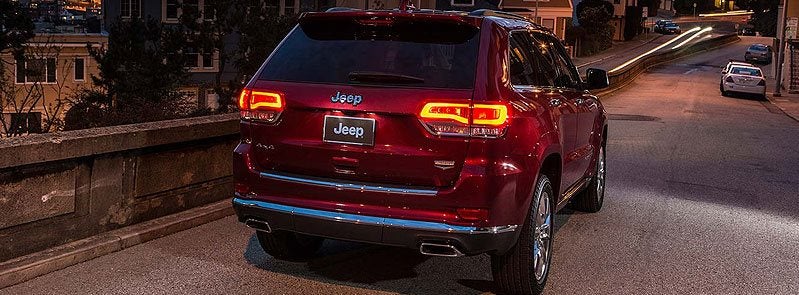
Credit: www.chryslerdodgejeepramofcolumbia.net
Why is My Jeep Cherokee Shaking When I Drive?
If your Jeep Cherokee is shaking when you drive, it could be due to a number of different issues. Here are some potential causes:
1. Your tires could be unbalanced or worn down. This can cause your whole vehicle to shake, especially at higher speeds. To fix this, have your tires balanced or replaced as needed.
2. Your brakes could be the issue. If your brake pads are getting low or your rotors are warped, this can cause shaking and vibration when you brake. Be sure to have your brakes checked regularly to avoid this problem.
3. Your engine mounts could be worn out or damaged. This can cause your engine to move around excessively, which will in turn make the whole vehicle shake. Replacing your engine mounts should fix the problem.
Why is My Jeep Cherokee Shaking When Idling
There are a few reasons your Jeep Cherokee may be shaking when idling.
- One reason could be that your engine is misfiring. This can happen if your spark plugs are worn out or if there is an issue with your ignition system.
- Another possibility is that your engine is low on oil. This can cause your engine to shake as well as cause other issues.
- Finally, your Jeep Cherokee may be shaking due to a problem with the transmission or drivetrain.
If you’re unsure what’s causing the shaking, it’s best to take it to a mechanic for diagnosis and repair.
Jeep Cherokee Shakes When Accelerating
The Jeep Cherokee is a popular SUV that is known for its off-road capabilities. However, some drivers have reported that their Cherokee shakes when accelerating. This can be a very annoying and potentially dangerous problem.
There are a few different things that could be causing your Cherokee to shake when accelerating.
- One possibility is that the engine mounts are worn out or damaged. If the engine mounts are not holding the engine securely, it can cause the engine to move around and vibrate, which will make the whole vehicle shake.
- Another possibility is that there is an issue with the transmission. If the transmission is not shifting properly, it can cause the car to shake.
- Finally, uneven tire wear can also cause shaking, as can warped brake rotors.
If your Cherokee is shaking when you accelerate, take it to a mechanic to have it checked out as soon as possible. Shaking can be caused by serious issues like worn engine mounts or transmission problems, so it’s best to get it checked out before something more serious happens.
Jeep Cherokee Shaking Check Engine Light
If you have a Jeep Cherokee and the check engine light is shaking, there are a few things that could be causing it.
- One possibility is that your oxygen sensor needs to be replaced.
- Another possibility is that your spark plugs are fouled and need to be replaced.
If your Jeep has a lot of miles on it, it’s also possible that the engine mounts are worn out and need to be replaced.
Jeep Cherokee Shakes at 60 Mph
If you own a Jeep Cherokee, you may have experienced a shaking sensation while driving at high speeds. This problem is most commonly reported at around 60 mph, and can be quite concerning for drivers. While the cause of this problem is not always clear, there are a few potential explanations.
First, it is possible that the shaking is simply due to uneven pavement or windy conditions. If this is the case, there is no need to worry as the issue should resolve itself once you slow down or change directions.
However, if the shaking persists even when driving on smooth roads or in calm weather, it could be indicative of a more serious problem.
- One possibility is that your tires are unbalanced or wearing unevenly.
- Another possibility is that your suspension system needs to be serviced or replaced.
If you’re experiencing Jeep Cherokee shakes at 60 mph, it’s best to take your vehicle to a qualified mechanic for diagnosis and repair.
Wrapping Up
Understanding the reasons behind your Jeep Cherokee’s shaking can help prevent further damage and ensure a safer driving experience. From unbalanced wheels to worn-out suspension components, various factors contribute to this issue. By addressing these issues promptly, you can restore the smoothness and stability of your vehicle.
Remember to consult a professional mechanic for a thorough diagnosis and solution. Drive with confidence and enjoy the comfort of a well-maintained Jeep Cherokee.
FAQs
Why Does My Jeep Randomly Shake While Driving?
A Jeep may shake while driving due to several factors, including tire issues, suspension problems, or engine complications. It’s important to have a mechanic inspect your vehicle to determine the exact cause of the shaking and arrange for necessary repairs.
Why Is My Jeep Cherokee Shaking When Idling?
Your Jeep Cherokee may shake when idling due to faulty spark plugs, a clogged fuel filter, or a vacuum leak. Get a professional inspection to diagnose and fix the issue. Regular maintenance can prevent such problems in the future.
Why Does My Jeep Shake When I Hit 70 Mph?
Your Jeep may shake at 70 mph due to tire imbalance, worn-out suspension components, or alignment issues. Get a professional inspection to diagnose and resolve the problem for a smoother ride.
How Do You Fix A Jeep Death Wobble?
To fix a Jeep death wobble, check and tighten all the suspension components, including track bar, control arms, and tie rods. Inspect and replace any worn or damaged parts. Ensure proper tire balance and alignment. Install a steering stabilizer if needed.
Seek professional help if the issue persists.

